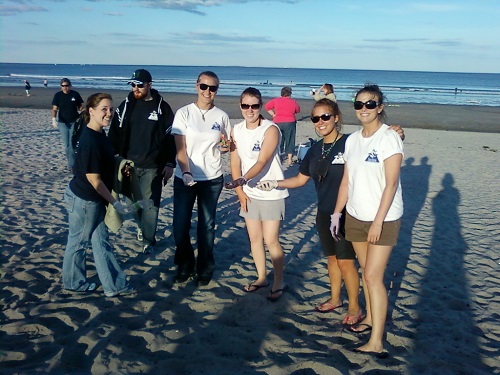What is a beach cleanup and why bother?!
Beach cleanups are exactly what they sound like…cleaning up a beach! Volunteers gather any trash they find within a designated location on the beach and record their findings for data collection and future research. By keeping beaches trash free, we help protect marine life and preserve their environment! Marine debris is currently one of the biggest threats to marine life due to ingestion or entanglement. It takes just one piece of trash; a cigarette butt, a candy wrapper, or a straw, to end an animals life. So imagine the impact you’ll be making by joining an entire squad of fellow conservationists cleaning the beach! Not only that, but it also makes the beach a much nicer and cleaner place for us humans to enjoy as well. Plus, beach cleanups are a great way to meet fellow community members and new friends!
How does it work?
Once you sign up you simply show up (look for the “Beach Cleanup” sign), and get to work! All materials necessary are provided, such as a bag, data sheet, and gloves. The group is then given a designated area to patrol for trash. All trash found is categorized (microplastics, paper, rope, ect.) and tallied on a data sheet, which provides the Blue Ocean Society with valuable data on the trash and pollutants found on our beaches. Once you are finished you turn in your bag of trash and data sheet, and head home with your good deed done for the day!
How can I join a cleanup?!
Head here and scroll down to “Blue Ocean Society beach cleanup sign up”, fill out your information, and select what dates you would like to join. If you would like to organize a beach cleanup ofnyour own, you can access the Digital Cleanup Kit, which contains instructions on planning one, supplies needed, safety information, and a data card!
How else can I help?!
- Pick up trash whether you’re on a beach cleanup or not! As mentioned before, all it takes is one piece of trash to have an adverse effect on an animal or the environment, so every piece collected makes a difference. Carrying a glove or small bag with you at all times can make the process easier! You can also download the “Marine Debris Tracker” app, access Blue Ocean Society’s data card, and record any of your findings directly on there. (More info at https://www.blueoceansociety.org/blog/digital_cleanup_kit/).
- Try to reduce your waste wherever you can. A majority of thrown away or recycled items don’t always end up in a landfill or a recycling plant, so refusing things such as single-use plastics can eliminate your pollution footprint on our oceans.
- Spread the word! The more people involved, the bigger the impact we can have on our oceans. There are more uninformed people out there than you think that would love to be involved if they only knew.
To learn more about beach cleanups, pollution, and how you can help, check out the links below!
- Beach Cleanup Information and Sign-Up
- Digital Cleanup Kit
- Adopt-a-Beach Program
- No More Balloon Releases!






